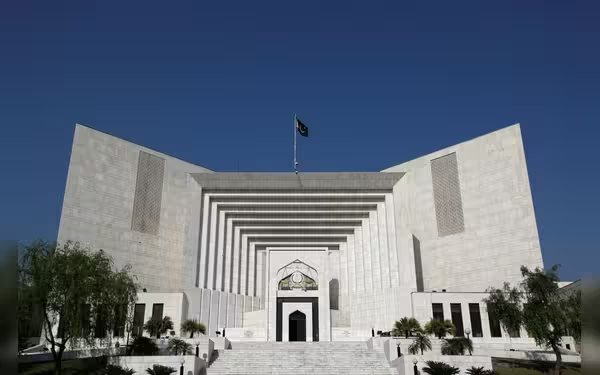Saturday, November 16, 2024 07:45 PM
Supreme Court Review Petition on Article 63-A Scheduled for September 30
- Supreme Court to review Article 63-A on September 30.
- Five-member bench led by Chief Justice Qazi Faez Isa.
- Hearing could impact political landscape and party loyalty.
 Image Credits: en.dailypakistan.com.pk
Image Credits: en.dailypakistan.com.pkThe Supreme Court of Pakistan will hear a review petition on Article 63-A, impacting political stability and disqualification of lawmakers.
The Supreme Court of Pakistan is set to hear a significant review petition concerning Article 63-A of the Constitution on September 30. This article is crucial as it deals with the disqualification of lawmakers on the grounds of defection. The upcoming hearing has garnered considerable attention, as it could have far-reaching implications for the political landscape of the country.
A five-member bench, led by Chief Justice Qazi Faez Isa, will preside over the case. The bench will also include Justices Muneeb Akhtar, Aminuddin Khan, Jamal Mandokhail, and Mazhar Alam Miankhel. The composition of this bench indicates the seriousness with which the court is approaching this matter, as it involves fundamental questions about the integrity of the electoral process and the responsibilities of elected representatives.
Article 63-A is particularly important because it aims to maintain the stability of political parties by preventing lawmakers from switching allegiances for personal gain. This provision is designed to uphold the democratic process and ensure that elected officials remain accountable to their constituents. However, the interpretation and application of this article have often been contentious, leading to various legal challenges.
The review petition will likely explore the nuances of how Article 63-A has been applied in past cases and whether any changes or clarifications are necessary. As the political environment in Pakistan continues to evolve, the outcome of this hearing could set a precedent for future cases involving party loyalty and disqualification.
The Supreme Court's decision on September 30 will not only impact the current political scenario but also shape the future of governance in Pakistan. It is a reminder of the delicate balance between individual rights and collective responsibility in a democracy. As citizens, it is essential to stay informed about such developments, as they directly affect the functioning of our political system and the representation we receive from our elected officials.













